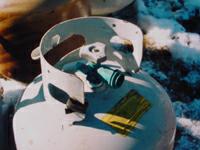Claim: Propane tanks used in the manufacture of methamphetamine are being returned to stores and resold.
 | TRUE: Propane tanks used to transport anhydrous ammonia, a substance used in the manufacture of meth, are dangerous to use because they've been structurally weakened. |
 | UNDETERMINED: Such tanks are being returned to stores by meth cooks and resold to the public. |
Example: [Collected via e-mail, April 2008]
Meth Training Information
Hey guys. I was at a meth training/workshop yesterday and there was a lot of great new information presented. I wanted to let you all know about one thing that I was not aware of.
Meth cooks are getting the propane tanks from the exchanges at
After they are finished with them, they return them to the store. They are then refilled with propane and sent back for you and me to buy. Anhydrous ammonia is very corrosive and weakens the structure of the tank. It can be very dangerous when mixed with propane and hooked up to our grills, etc.
According to our presenter, you should inspect the propane tank for any blue or greenish residue around the valve areas. If it is present, refuse to purchase that one.
Origins: This warning is hard to classify with a simple "True," "False" or "Undetermined" because it contains factual elements that have been wrapped in what appears to be no more than conjecture. So we'll try to break it down, piece by piece.
Crystal methamphetamine makers use anhydrous ammonia in the manufacture of the drug. Anhydrous ammonia is easily obtainable because of its use as a fertilizer: it can be found on many farms and is sold by agricultural supply concerns.
Because anhydrous ammonia is a liquid that turns to a gas upon contact with air, it has to be stored and shipped under pressure in sturdy containers. The container

of choice for those who siphon it off from farms for use in the manufacture of meth is the portable propane tank, because those tanks are small enough for a thief to easily cart away. (Fire extinguishers have been put to this use as well.) Propane tanks that have been used for this type of transport or storage typically develop a greenish or bluish corrosion on their valves.
Anhydrous ammonia degrades the brass valves and fittings of propane tanks and bottles, rendering these units unsafe for further use, so one should therefore never buy a portable propane tank that displays the telltale bluish or greenish blossoming around its valve. (One should also report the seller of such a unit to the police, because the authorities will likely be quite interested in learning how that person came into possession of an item possibly used in the manufacture of crystal meth. Given that meth labs routinely explode, taking out not only drug manufacturers and their domiciles but also nearby houses and the innocent families that live within them, finding and reporting meth labs is truly everybody's business.) A warning put out by the Propane Gas Association of Canada more fully discusses the dangers inherent to those misused propane tanks.
Some retailers (such as
It is at this point that the factual portion of the helpful warning ends and conjecture begins. At this time, we haven't found evidence
confirming that unwary propane tank exchangers are going home with tanks compromised by anhydrous ammonia. Neither stores nor police departments are reporting that they are, and it doesn't make a great deal of sense that they would be. Criminals using portable propane tanks and bottles to transport and store anhydrous ammonia aren't interested in obtaining propane refills for their canisters, so they wouldn't be dropping off their empty units to the local
Finally, regarding those in the business of swapping filled propane containers for empties, while vendors might accept obviously compromised propane tanks from consumers looking to go home with full newer canisters, they are unlikely to put those suspect units back into the sales cycle. Propane canisters that appeared to have anything wrong with them (and corrosion of any color around the valve should certainly count) would be junked rather than mindlessly refilled and passed on to the next consumer. Only tanks that are in very good condition are sent back out.
The public should be keeping an eye out for propane tanks and bottles that manifest blue or green residue around their valves, but more in the sense of looking towards their neighbors' yards to see what the folks they live next to are getting up to.
Barbara "keeping up with the jonesing" Mikkelson
Additional information:
| | Meth Labs (Idaho State Police) |
| | Anhydrous Ammonia and Propane Cylinders (National Propane Gas Association) |
Last updated: 28 July 2011
Sources: |
Green, Erica. "Propane Tanks Used to Make Meth." News Channel 9, Chattanooga, TN. 28 April 2008. Kishter, Lindsay. "Funds Close Spigot for Meth Labs." Chicago Tribune. 2 July 2007. Nesbitt, Laura. "Meth Suspects Waive Preliminary Hearing." Albuquerque Journal. 13 December 2007 (p. A6). Propane Gas Association of Canada. "Propane Cylinders & Crystal Meth — Safety Alert." May 2006.
